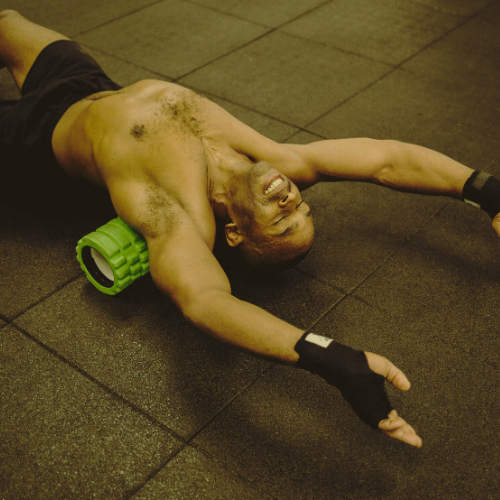Your Recovery Obsession Is Making You Weaker

Your Recovery Obsession Is Making You Weaker
You’re foam rolling your way out of progress.
Let’s start with the sacred cow: recovery.
It’s everywhere from glossy wellness campaigns to TikTok fitness gurus whispering “listen to your body” while they sit in $20,000 cryotherapy pods. Recovery has become a lifestyle, an identity, and for many, a full-time job.
But here’s the paradox: the more obsessed we become with recovering, the less we seem capable of actual effort. The pendulum has swung so far from overtraining that we’re now trapped in a cult of over-recovery worshipping comfort, vilifying strain, and calling it self-care.
In the process, we’ve forgotten something brutally simple: discomfort is the currency of adaptation.
The Biology of Stress and Why You Need It
Every improvement in human performance begins with a violation of equilibrium. You stress the system, it freaks out, it rebuilds. That’s the game.
In exercise science, this is known as the General Adaptation Syndrome, first described by endocrinologist Hans Selye in 1936. When you impose a stressor, say, lifting a heavy barbell or running a long hill, your body temporarily dips in performance. Then, during recovery, it rebounds to a higher baseline. That rebound is what we call supercompensation, the physiological essence of progress.
No stress, no rebound. No rebound, no improvement.
But the moment we treat all stress as toxic, we kill the signal. We try to recover from the very discomfort that’s supposed to make us better.
“The human body is antifragile,” says Dr. Andy Galpin, a leading exercise physiologist at Cal State Fullerton. “It gets stronger with appropriate doses of stress. The whole point of training is controlled damage. If you erase the damage too quickly, you erase the adaptation.”
And yet, erasing the damage has become the new goal.
When Recovery Becomes Self-Sabotage
Let’s talk about cold plunges, the crown jewel of modern recovery culture.
The idea sounds great: reduce soreness, cool inflammation, bounce back faster. But research paints a more complicated picture. A 2015 study in The Journal of Physiology found that post-workout ice baths can blunt muscle protein synthesis, the process that actually builds new muscle. In plain English: you might feel fresher, but you’re getting weaker.
The same story plays out with anti-inflammatory drugs. NSAIDs like ibuprofen suppress soreness by muting prostaglandins, chemical messengers involved in muscle repair. They make you feel better today at the cost of less growth tomorrow.
Even too much stretching or massage right after training can downregulate the immune and hormonal responses that trigger adaptation.
Recovery, done excessively or too early, becomes a form of biological micromanagement stepping in before your body can finish the work.
The Comfort Epidemic
Of course, this obsession didn’t emerge from nowhere. We live in an era where every discomfort has a workaround. Hungry? There’s a delivery app. Cold? Heated hoodie. Slightly stressed? Meditation playlist, CBD seltzer, weighted blanket.
Technology has made us allergic to friction.
And because the human brain equates comfort with safety, we’ve started confusing ease with health.
That’s why you’ll find weekend warriors skipping workouts because their recovery tracker says they’re “not optimized.” Or influencers doing “mental deload weeks” because they “need to protect their energy.”
This is the wellness version of financial over-diversification: spreading your risk so thin that you lose all returns. You don’t build resilience by constantly managing your state. You build it by surviving the chaos.
As neuroscientist Andrew Huberman puts it, “Stress isn’t inherently bad — it’s a tool. What matters is your ability to recover while still operating under load.”
In other words, resilience isn’t about perfect balance. It’s about staying in the game long enough to adapt.
Recovery Culture: From Tool to Identity
The problem isn’t recovery itself. It’s the identity built around it.
There’s an entire industry now selling “performance wellness.” Cryo spas, compression boots, red light therapy, sleep pods. All promising faster recovery, better HRV scores, optimized hormones. It’s biohacking for people who want the results of hard work without the hard work.
The irony is that the human body doesn’t need fancy recovery tools. It evolved through famine, injury, and environmental chaos all without Theraguns. What it does need is exposure to controlled stress and enough time to process it.
Dr. Galpin again: “Most people don’t need better recovery. They need better tolerance for stress. That’s what training does. It teaches your body and mind to handle discomfort without falling apart.”
Redefining Recovery
So what is smart recovery? It’s the art of managing stress, not eliminating it.
-
Sleep: Non-negotiable. But perfect sleep hygiene isn’t required. Seven hours is often enough.
-
Nutrition: Eat real food that supports your training, not supplements that pretend to.
-
Rest Days: Take them but use them intentionally. Move, walk, stretch, reflect. Don’t just cocoon.
-
Mindset: The goal isn’t to feel perfect. It’s to feel capable.
Recovery should restore function, not chase comfort. The purpose of rest is to prepare for the next bout of stress, to reload the system, not to live in permanent decompression.
Discomfort Is the Data
Every sensation your body sends, soreness, fatigue, doubt, is information. It tells you something about where your limits are and how close you’re getting to them.
But instead of interpreting these signals, we anesthetize them. We treat discomfort as something to be erased, not decoded.
That’s the real weakness.
Because discomfort is the feedback loop of growth. It’s how you know you’re not just existing, but evolving.
The body doesn’t grow in the ice bath. It grows in the struggle.
The Bottom Line
You don’t get stronger by avoiding stress. You get stronger by recovering from it and that only happens if you first endure it.
So yes, sleep. Eat. Stretch. But stop worshipping recovery like it’s the goal.
You don’t need to live in a state of perfect restoration. You need to live in a state of readiness.
Be smart. But stop being soft.
Because if you keep chasing comfort, you’ll never find capacity.
Real recovery isn’t what happens when you stop working.
It’s what happens when you’ve earned the right to.


Leave a comment